Eleanor Holmes Norton
Eleanor Holmes Norton (born June 13, 1937) is an American politician serving as a non-voting Delegate to the United States House of Representatives, representing the District of Columbia. As a non-voting member, Norton may serve on committees as well as speak on the House floor; however, she is not permitted to vote on the final passage of any legislation. She is a member of the Democratic Party.
Eleanor Holmes Norton | |
|---|---|
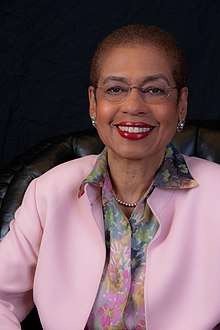 | |
| Delegate to the U.S. House of Representatives from the District of Columbia's at-large district | |
| Assumed office January 3, 1991 | |
| Preceded by | Walter Fauntroy |
| Chair of the Equal Employment Opportunity Commission | |
| In office May 27, 1977 – February 21, 1981 | |
| President | Jimmy Carter Ronald Reagan |
| Preceded by | Lowell W. Perry |
| Succeeded by | Clarence Thomas |
| Personal details | |
| Born | June 13, 1937 Washington, D.C., U.S. |
| Political party | Democratic |
| Spouse(s) | Edward Norton
( m. 1965; div. 1993) |
| Children | 2 |
| Education | Antioch College (BA) Yale University (MA, LLB) |
| Website | House website |
Early life and education

Eleanor K. Holmes was born in Washington, D.C., the daughter of Vela (née Lynch), a schoolteacher, and Coleman Holmes, a civil servant. While a student at Dunbar High School she was elected junior class president and was a member of the National Honor Society.[1] She attended Antioch College (B.A. 1960), Yale University (M.A. in American Studies 1963)[2] and Yale Law School (LL.B 1964).[3]
While in college and graduate school, she was active in the civil rights movement and an organizer for the Student Nonviolent Coordinating Committee. By the time she graduated from Antioch, she had already been arrested for organizing and participating in sit-ins in Washington, D.C., Maryland, and Ohio. While in law school, she traveled to Mississippi for the Mississippi Freedom Summer and worked with civil rights stalwarts such as Medgar Evers. Her first encounter with a recently released but physically beaten Fannie Lou Hamer forced her to bear witness to the intensity of violence and Jim Crow repression in the South.[4] Her time with the SNCC inspired her lifelong commitment to social activism and her budding sense of feminism. She contributed the piece "For Sadie and Maud" to the 1970 anthology Sisterhood is Powerful: An Anthology of Writings From The Women's Liberation Movement, edited by Robin Morgan.[5][6] Norton was on the founding advisory board of the Women's Rights Law Reporter (founded 1970), the first legal periodical in the United States to focus exclusively on the field of women's rights law. In the early 1970s, Norton was a signer of the Black Woman’s Manifesto, a classic document of the Black feminist movement.[7]
Career before Congress
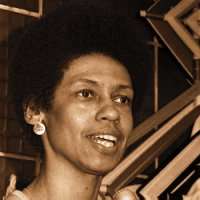
Upon graduation from law school, she worked as a law clerk to Federal District Court Judge A. Leon Higginbotham, Jr.[2] In 1965, she became the assistant legal director of the American Civil Liberties Union, a position she held until 1970.[8] In 1970, Norton represented sixty female employees of Newsweek who had filed a claim with the Equal Employment Opportunity Commission that Newsweek had a policy of only allowing men to be reporters.[9] The women won, and Newsweek agreed to allow women to be reporters.[9]
Holmes Norton specialized in freedom of speech cases, and her work included winning a Supreme Court case on behalf of the National States' Rights Party,[10] a victory she put into perspective in an interview with one of the District of Columbia Bar's website editors: "I defended the First Amendment, and you seldom get to defend the First Amendment by defending people you like ... You don’t know whether the First Amendment is alive and well until it is tested by people with despicable ideas. And I loved the idea of looking a racist in the face—remember this was a time when racism was much more alive and well than it is today—and saying, 'I am your lawyer, sir, what are you going to do about that?'"[2] She worked as an adjunct assistant professor at New York University Law School from 1970 to 1971.[11] In 1970, Mayor John Lindsay appointed her as the head of the New York City Human Rights Commission, and she held the first hearings in the country on discrimination against women.[12] Prominent feminists from throughout the country came to New York City to testify, while Norton used the platform as a means of raising public awareness about the application of the Civil Rights Act of 1964 to women and sex discrimination.[4]
Appointed by President Jimmy Carter as the first female chair of the U.S. Equal Employment Opportunity Commission in 1977,[8] Norton released the EEOC's first set of regulations outlining what constituted sexual harassment and declaring that sexual harassment was indeed a form of sexual discrimination that violated federal civil rights laws.[13][14]
She has also served as a senior fellow of the Urban Institute.[15] Norton became a professor at Georgetown University Law Center in 1982.[8] During this time, she was a vocal anti-apartheid activist in the U.S., and was a part of the Free South Africa Movement.
In 1990, Norton, along with 15 other African American women and one man, formed African-American Women for Reproductive Freedom.[16]
She contributed the piece "Notes of a Feminist Long Distance Runner" to the 2003 anthology Sisterhood Is Forever: The Women's Anthology for a New Millennium, edited by Robin Morgan.[17]
She received a Foremother Award for her lifetime of accomplishments from the National Research Center for Women & Families in 2011.[18]
Delegate to Congress
.jpg)
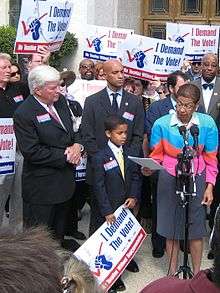
Norton was elected in 1990 as a Democratic delegate to the House of Representatives and uses the title "Congresswoman."[19] She defeated city council member Betty Ann Kane in the primary despite the last-minute revelation that Norton and her husband, both lawyers, had failed to file D.C. income tax returns between 1982 and 1989.[20] The Nortons paid over $80,000 in back taxes and fines.[21][22] Her campaign manager was Donna Brazile.[22] The delegate position was open because Del. Walter Fauntroy was running for mayor rather than seeking reelection.[23] Norton received 39 percent of the vote in the Democratic primary election,[24] and 59 percent of the vote in the general election.[25] Norton took office on January 3, 1991, and has been reelected every two years since.[23]
Delegates to Congress are entitled to sit in the House of Representatives and vote in committee, and to offer amendments in the Committee of the Whole, but are not allowed to take part in legislative floor votes.[26][27] The district and four U.S. territories—Guam, American Samoa, the Northern Mariana Islands, and the U.S. Virgin Islands—send delegates to Congress; the Resident Commissioner of Puerto Rico has the same rights as delegates.[26]
William Thomas and the White House Peace Vigil inspired Norton to introduce the Nuclear Disarmament and Economic Conversion Act, which would require the United States to disable and dismantle its nuclear weapons at such time as all other nations possessing nuclear weapons do likewise.[28] Norton has been introducing a version of the bill since 1994.[28]
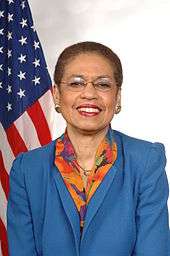
Legislation strongly supported by Norton that would grant the District of Columbia a voting representative in the House, the District of Columbia House Voting Rights Act of 2009, was passed by the United States Senate on February 26, 2009. However the legislation stalled in the House and failed to pass prior to the end of the 111th Congress.
The legislation proposed in 2009 did not grant Norton the right to vote in the 111th Congress, as she would have had to remain in her elected office of delegate for the duration of her two-year term.[29]
In September 2010, the national press criticized Norton after the release of a voice message in which she solicited campaign funds from a lobbyist representing a project that she oversaw. Norton countered that the message was typical of appeals made by all members of Congress, and that the call was made from campaign offices not paid for by taxpayers.[30] In March 2012, the public radio series This American Life featured the voicemail message at the start of a program on lobbying titled "Take the Money and Run for Office".[31]
In May 2012, Norton was blocked from testifying on an anti-abortion bill in her district—the second time she has been blocked from speaking about abortion. She insisted that it was a denial of a common courtesy. Representative Jerrold Nadler supported Norton's protest, saying "Never in my 20 years as a member of Congress have I seen a colleague treated so contemptuously."[32][33][34]
In August 2014, after the D.C. Board of Elections voted to put a question about marijuana legalization on the ballot in November 2014, Norton vowed to defend against any congressional attempt to stop the district from voting on the issue and to, if approved, fight any attempt to prevent implementation.[35]
She is a member of the Congressional Progressive Caucus[36] and the Congressional Black Caucus.[37]
Committee assignments
- Committee on Oversight and Government Reform
- Subcommittee on Federal Workforce, Post Office, and the District of Columbia
- Subcommittee on Information Policy, Census, and National Archives
- Committee on Transportation and Infrastructure
Caucus memberships
Legislation sponsored
- On July 8, 2013, Norton sponsored H.R. 2611 (An act to designate the Douglas A. Munro Coast Guard Headquarters Building (H.R. 2611; 113th Congress)) to name the new Coast Guard headquarters after Munro, the United States Coast Guard's only Medal of Honor recipient.[43]
- On October 28, 2013, Norton sponsored H.R. 3343 (To amend the District of Columbia Home Rule Act to clarify the rules regarding the determination of the compensation of the Chief Financial Officer of the District of Columbia), a bill that would increase the cap on D.C.'s CFO pay from $199,700 to around $250,000.[44][45]
- On March 10, 2014, Norton sponsored the District of Columbia Courts, Public Defender Service, and Court Services and Offender Supervision Agency Act of 2014 (H.R. 4185; 113th Congress), a bill that would make changes to the District of Columbia Official Code that governs the D.C. Courts system.[46][47] Norton argued that the bill "will help make our local justice process more efficient and, therefore, more effective for the residents of the District."[48]
Legislation supported
- Norton supported the Digital Accountability and Transparency Act of 2014 (S. 994; 113th Congress), a bill that would make information on federal expenditures more easily accessible and transparent.[49] The bill would require the U.S. Department of the Treasury to establish common standards for financial data provided by all government agencies and to expand the amount of data that agencies must provide to the government website, USASpending. Norton said that the bill "will improve the quality of data that agencies make available about their spending."[50]
- Norton supported the bill "To amend the Act entitled An Act to regulate the height of buildings in the District of Columbia to clarify the rules of the District of Columbia regarding human occupancy of penthouses above the top story of the building upon which the penthouse is placed" (H.R. 4192). The bill would increase the height limit of penthouses in D.C. to 20 feet, allowing for human occupancy. Norton said that "this bill is not a mandate directing the city to make any changes to penthouses or to its existing comprehensive plan or local zoning laws more generally."[51]
Appearances
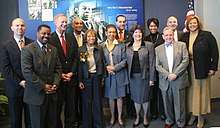
On July 27, 2006, Norton appeared on the "Better Know a District" segment of Comedy Central's The Colbert Report, in which she spiritedly defended the District of Columbia's claim to being a part of the United States.[52] She also appeared on the joint The Colbert Report/The Daily Show "Midterm Midtacular" special on November 7, 2006.[53] Norton gave further interviews to Stephen Colbert on March 22, 2007,[54] and April 24, 2007, on the subject of representation in the District of Columbia.[55] On February 12, 2008, Colbert and Norton discussed her status as a superdelegate as well as her support of Barack Obama for president.[56] She appeared once again on February 11, 2009, to discuss D.C. representation and promised Colbert that she would make him an honorary citizen of Washington, D.C., and give him a key to the city, if D.C. citizens were given representation. Colbert in turn gave Norton a "TV promise" that he would be there should that happen.[57] Norton made a further appearance on Colbert's show on June 25, 2014, where she discussed the impact that African-American Democrats had on incumbent Thad Cochran's primary defeat of Chris McDaniel, a Tea Party candidate, as well as Colbert's final episode among a cadre of past guests.[58]
On June 27, 2008, Norton appeared on Democracy Now! to discuss the Supreme Court's ruling in District of Columbia v. Heller,[59] which she strongly opposed. On December 5, 2014, Norton appeared on Hannity to discuss the shooting death of Michael Brown in Ferguson, Missouri, on which she admitted she did not read the evidence of the case, but criticized the racial profiling of young African Americans.[60][61]
Legislation regarding NFL tax-exempt status
On October 2, 2014, ABC News reported that Holmes Norton, discussing her co-sponsorship of a bill aimed at changing the National Football League's tax-exempt status, stated: "The NFL greed is so widespread that they’ve chosen to operate as a tax-exempt organization. So we want to take that choice away from them unless, and until, they decide not to profit from a name that has now officially been declared a racial slur.”[62] In essence, Holmes Norton's position was that until the NFL forced the Washington Redskins owner (Daniel Marc Snyder) to change the team name she would support legislation that would change the NFL's tax status thereby costing the league money.[63]
In popular culture
Eleanor Holmes Norton is portrayed by Joy Bryant in Amazon Video's original series Good Girls Revolt and by Donna Biscoe in the HBO original movie Confirmation.[64][65]
She is featured in the feminist history film She's Beautiful When She's Angry.[66][67]
Personal life
Norton was married to Edward Norton, who died in 2014.[68] She has two children, John, and Katherine, who has Down syndrome.[68][69]
Awards
- Foremother Award from National Center for Health Research, 2011 [70]
- Honoree, National Women's History Alliance, 2020[71]
See also
References
- "Liber Anni 1955 (Dunbar High School, Washington, D.C.)". Ancestry.com. Generations Network. 1955. Retrieved May 9, 2020.
- Staff (June–July 1997). "Legends in the Law. A Conversation with Eleanor Holmes Norton". The District of Columbia Bar. Retrieved March 16, 2012.
- "Congresswoman Eleanor Holmes Norton". Congresswoman Eleanor Holmes Norton. Retrieved September 27, 2018.
- Voices of the Civil Rights Movement Archived February 2, 2009, at the Wayback Machine
- Sisterhood is powerful: an anthology of writings from the women's liberation movement (Book, 1970). [WorldCat.org]. OCLC 96157.
- Rosalyn Baxandall; Linda Gordon (May 17, 2001). Dear Sisters: Dispatches From The Women's Liberation Movement. Basic Books. pp. 213, 214–. ISBN 978-0-7867-3133-6.
- "Black Women's Manifesto". Retrieved September 27, 2018.
- Donna Hightower-Langston (2002). A to Z of American Women Leaders and Activists. Infobase Publishing. pp. 165–166. ISBN 978-1-4381-0792-9. Retrieved March 16, 2012.
- "Newsweek Agrees to End Sex Discrimination Policy". Associated Press. August 28, 1970.
- "Court Revokes Ban On Extremists' Rally". Associated Press. November 20, 1968.
- Rebecca Mae Salokar; Mary L. Volcansek (1996). Women in Law: A Bio-Bibliographical Sourcebook. Greenwood Publishing Group. p. 205. ISBN 978-0-313-29410-5. Retrieved March 16, 2012.
- Rebecca Mae Salokar; Mary L. Volcansek (1996). Women in Law: A Bio-Bibliographical Sourcebook. Greenwood Publishing Group. pp. 203–204. ISBN 978-0-313-29410-5. Retrieved March 16, 2012.
- "Sexual Harassment - Further Readings". law.jrank.org. Retrieved September 27, 2018.
- Pear, Robert (April 12, 1980). "New Rules Ban Sexual Harassment at Work". New York Times News Service.
- Staff (1988). "Urban Institute Annual Report 1988" (PDF). Urban Institute. Retrieved March 16, 2012.
- Kathryn Cullen-DuPont (August 1, 2000). Encyclopedia of women's history in America. Infobase Publishing. p. 6. ISBN 978-0-8160-4100-8. Retrieved February 4, 2012.
- "Library Resource Finder: Table of Contents for: Sisterhood is forever : the women's anth". Vufind.carli.illinois.edu. Retrieved October 15, 2015.
- Staff (2011). "2011 Foremothers & Health Policy Hero Awards. Foremothers Lifetime Achievement Awards". National Research Center for Women and Families. Archived from the original on September 27, 2011. Retrieved March 16, 2012.
- "Congresswoman Eleanor Holmes Norton". Congresswoman Eleanor Holmes Norton. Retrieved September 27, 2018.
- "Hopeful Won't Quit Despite Tax Woes". September 10, 1990.
- Abramowitz, Michael (September 12, 1990). "D.C. Delegate; Norton Overcomes Last-Minute Crisis to Win". The Washington Post. p. A21. Retrieved July 28, 2008.
- Melton, R.H.; Abramowitz, Michael (September 25, 1990). "Second D.C. Candidate Didn't Pay Taxes; Shadow Seat Hopeful Says Failure to File Is a Protest for Statehood". The Washington Post. p. A01. Retrieved July 28, 2008.
- District of Columbia Board of Elections and Ethics. "Historical Elected Officials: Delegate to the US House of Representatives". Archived from the original on July 16, 2008. Retrieved July 20, 2008.
- Ayres Jr, B. Drummond (September 12, 1990). "Woman Nominated for Capital Mayor". The New York Times.
- Keil, Richard (November 5, 1990). "Barry Loses Bid for City Council". Associated Press.
- Representatives, Office of the Clerk, U.S. House of. "Office of the Clerk of the U.S. House of Representatives - Member FAQs". clerk.house.gov. Retrieved September 27, 2018.
- "All News Clips". Retrieved September 27, 2018.
- "Norton Files Nuclear Disarmament Bill to Implement D.C. Ballot Initiative". March 19, 2009.
- "Text of S.160 as Introduced in Senate District of Columbia House Voting Rights Act of 2009". OpenCongress. Archived from the original on February 26, 2009.
- Siegel, Hannah. "Dialing For Dollars: Democratic Rep. Asks Lobbyist For Campaign Cash In Voicemail". ABC News. Retrieved April 16, 2012.
- "Take the Money and Run for Office". This American Life. PRI. Retrieved April 16, 2012.
- ROBILLARD, KEVIN (May 17, 2012). "Norton refused testimony in anti-abortion hearing". Politico. Retrieved June 19, 2012.
- "Norton Testimony Denied at D.C. Abortion Hearing". NBC4 Washington. May 17, 2012.
- "They did it again: GOP refuses to hear Congresswoman's testimony on DC abortion bill". MSNBC. May 18, 2012. Archived from the original on May 21, 2012. Retrieved June 19, 2012.
- Hess, Hannah. "Norton Vows to Defend D.C.'s Pot Legalization Initiative From Congress". rollcall.com. Roll Call. Retrieved August 7, 2014.
- "Caucus Members". Congressional Progressive Caucus. Retrieved January 30, 2018.
- "Membership". Congressional Black Caucus. Retrieved March 7, 2018.
- "Members". House Baltic Caucus. Retrieved February 21, 2018.
- "Membership". Congressional Arts Caucus. Archived from the original on June 12, 2018. Retrieved March 13, 2018.
- "Congressional Freethought Caucus expands rapidly". Freedom from Religion Foundation. Archived from the original on September 26, 2018. Retrieved September 26, 2018.
- "90 Current Climate Solutions Caucus Members". Citizen´s Climate Lobby. Retrieved October 20, 2018.
- "Members". U.S. - Japan Caucus. Retrieved December 14, 2018.
- Norton, Eleanor Holmes. "The Introduction of a Bill to Name the U.S. Coast Guard Headquarters -- (Extensions of Remarks - July 08, 2013)". Library of Congress. Retrieved July 15, 2013.
- Debonis, Mike (July 8, 2013). "Search for D.C.'s next CFO takes shape". Washington Post. Retrieved November 19, 2013.
- "H.R. 3343 - Summary". United States Congress. Retrieved November 18, 2013.
- "CBO - H.R. 4185". Congressional Budget Office. Retrieved July 15, 2014.
- "H.R. 4185 - Summary". United States Congress. Retrieved July 15, 2014.
- "Norton Bill to Strengthen Local Justice Process in D.C. Passes House". Office of Eleanor Holmes Norton. Retrieved July 15, 2014.
- "CBO - S. 994". Congressional Budget Office. Retrieved April 28, 2014.
- Marcos, Cristina (April 28, 2014). "Federal transparency bill headed to White House". The Hill. Retrieved April 29, 2014.
- Marcos, Cristina (April 28, 2014). "House votes to allow more DC penthouses". The Hill. Retrieved April 29, 2014.
- "The Colbert Report - 07/27/2006 - Better Know a District - District of Columbia - Eleanor Holmes Norton". Retrieved September 27, 2018.
- "The Colbert Report: Indecision 2006 - Midterm Midtactular - 11/07/2006 - Robert Wexler and Eleanor Holmes Norton". Retrieved September 27, 2018.
- "The Colbert Report - 03/22/2007 - Eleanor Holmes Norton". Retrieved September 27, 2018.
- "The Colbert Report - 04/24/2007 - Eleanor Holmes Norton". Retrieved September 27, 2018.
- "The Colbert Report - 02/12/2008 - Eleanor Holmes Norton". Retrieved September 27, 2018.
- "The Colbert Report - 02/11/2009 - DC Voting Rights Act - Eleanor Holmes Norton". Retrieved September 27, 2018.
- Cohen, Matt. "Eleanor Holmes Norton Vs Stephen Colbert, Round Four". DCist.com. Gothamist. Archived from the original on November 9, 2014. Retrieved June 26, 2014.
- "Supreme Court Strikes Down DC Handgun Ban". Retrieved September 27, 2018.
- Josh Feldman. "Hannity Rips Into Eleanor Holmes Norton: You Didn't Read Ferguson Evidence?!". Mediaite. Retrieved December 5, 2014.
- Eric Garland. "Hannity, Norton clash over Ferguson evidence". The Hill. Retrieved December 5, 2014.
- Klein, Rick. "'Capital Games': Behind Congress' 'Attack' on NFL Tax Breaks". ABC News. Retrieved September 27, 2018.
- "Yahoo Sports NFL". sports.yahoo.com. Retrieved September 27, 2018.
- Bailey, Alyssa (October 20, 2016). "The Stars of 'Good Girls Revolt' on What 1960s Revolutionaries Can Teach Us". ELLE. Retrieved March 31, 2020.
- Confirmation (TV Movie 2016) - IMDb, retrieved March 31, 2020
- "The Women". Retrieved April 28, 2017.
- "The Film — She's Beautiful When She's Angry". Shesbeautifulwhenshesangry.com. Retrieved April 28, 2017.
- Adam Bernstein (August 28, 2014). "Edward Norton, lawyer whose tax flouting nearly cost wife a career in Congress, dies". Washington Post. Washington, DC. Retrieved August 28, 2014.
- Sue Anne Pressley (May 22, 2005). "For politician, daughter is bliss". Chicago Tribune. Retrieved May 22, 2015.
- http://www.center4research.org/foremother-health-policy-hero-awards/#5
- "2020 Honorees". National Women's History Alliance. Retrieved January 8, 2020.
Further reading
- Lester, Joan Steinau; Holmes Norton, Eleanor (2004). Fire in My Soul. Foreword by Coretta Scott King. New York City: Atria Books. ISBN 978-0-7434-2445-5.CS1 maint: ref=harv (link)
External links
- Congresswoman Eleanor Holmes Norton official US House website
- Eleanor Holmes Norton at Curlie
- Appearances on C-SPAN
- Biography at the Biographical Directory of the United States Congress
- Profile at Vote Smart
- Financial information (federal office) at the Federal Election Commission
- Legislation sponsored at the Library of Congress
- SNCC Digital Gateway: Eleanor Holmes Norton, Documentary website created by the SNCC Legacy Project and Duke University, telling the story of the Student Nonviolent Coordinating Committee & grassroots organizing from the inside-out
- History and powers of DC's Delegate to Congress
- The Colbert Report: Better Know a District – District of Columbia – Eleanor Holmes Norton Pt. 1
| U.S. House of Representatives | ||
|---|---|---|
| Preceded by Walter Fauntroy |
Delegate to the U.S. House of Representatives from the District of Columbia's at-large congressional district 1991–present |
Incumbent |
| U.S. order of precedence (ceremonial) | ||
| Preceded by Chris Jacobs as U.S. Representative |
United States Delegates by seniority 1st |
Succeeded by Gregorio Sablan |
